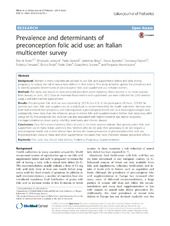| dc.contributor.author | Nilsen, Roy Miodini | en_US |
| dc.contributor.author | Leoncini, Emanuele | en_US |
| dc.contributor.author | Gastaldi, Paolo | en_US |
| dc.contributor.author | Allegri, Valentina | en_US |
| dc.contributor.author | Agostino, Rocco | en_US |
| dc.contributor.author | Faravelli, Francesca | en_US |
| dc.contributor.author | Ferrazzoli, Federica | en_US |
| dc.contributor.author | Finale, Enrico | en_US |
| dc.contributor.author | Ghirri, Paolo | en_US |
| dc.contributor.author | Scarano, Gioacchino | en_US |
| dc.contributor.author | Mastroiacovo, Pierpaolo | en_US |
| dc.date.accessioned | 2016-08-10T08:35:49Z | |
| dc.date.available | 2016-08-10T08:35:49Z | |
| dc.date.issued | 2016-07-13 | |
| dc.Published | Italian Journal of Pediatrics 2016, 42(1):65 | eng |
| dc.identifier.issn | 1824-7288 | |
| dc.identifier.uri | https://hdl.handle.net/1956/12534 | |
| dc.description.abstract | Background: Women in many countries are advised to use folic acid supplements before and early during pregnancy to reduce the risk of neural tube defects in their infants. This study aimed to update the prevalence and to identify possible determinants of preconception folic acid supplement use in Italian women. Methods: The study was based on cross-sectional data from seven maternity clinics located in six Italian regions from January to June, 2012. Data on maternal characteristics and supplement use were collected for 2,189 women using a self-administered questionnaire. Results: Preconception folic acid use was reported by 23.5 % (n = 515) of the participants. Of these, 479 (93 %) women had taken folic acid supplements on a daily basis as recommended by the health authorities. Women who both had intended their pregnancy and had requested a preconception health visit to a doctor/gynecologist were substantially more likely than the reference group to initiate folic acid supplementation before their pregnancy (48.6 versus 4.8 %). Preconception folic acid use was also associated with higher maternal age, higher education, marriage/cohabitation, lower parity, infertility treatments, and chronic disease. Conclusions: Data from seven maternity clinics located in six Italian regions indicate that preconception folic acid supplement use in many Italian women is low. Women who do not plan their pregnancy or do not request a preconception health visit to their doctor have among the lowest prevalence of preconception folic acid use. Improving folate status in these and other supplemental non-users may have important disease preventive effects. | en_US |
| dc.language.iso | eng | eng |
| dc.publisher | BioMed Central | eng |
| dc.rights | Attribution CC BY | eng |
| dc.rights.uri | http://creativecommons.org/licenses/by/4.0 | eng |
| dc.subject | Folic acid | eng |
| dc.subject | Italy | eng |
| dc.subject | Neural tube defects | eng |
| dc.subject | Predictors | eng |
| dc.subject | Pregnancy | eng |
| dc.subject | Supplementation | eng |
| dc.title | Prevalence and determinants of preconception folic acid use: an Italian multicenter survey | en_US |
| dc.type | Peer reviewed | |
| dc.type | Journal article | |
| dc.date.updated | 2016-07-13T16:03:04Z | |
| dc.description.version | publishedVersion | en_US |
| dc.rights.holder | Copyright 2016 The Authors | |
| dc.identifier.doi | https://doi.org/10.1186/s13052-016-0278-z | |

